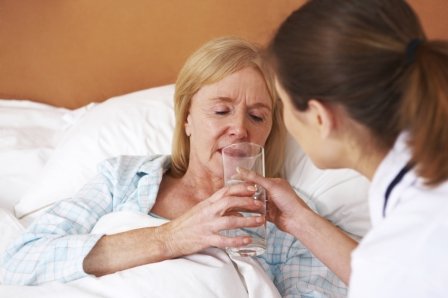Hospital Drinking Water
Is It Safe to Drink?
by Nancy Hearn, CNC
Note: As an Amazon Associate I earn from qualifying purchases.
When you think of a hospital, what comes to mind? In most cases, we would say that a hospital is where sick people go to get better.
What if you were told that your county hospital may not be giving patients, visitors and staff drinking water that was safe?
Unnerving Statistics Recently Released
There is one simple truth in all this. Unless your hospital has some sort of filtration system or is providing water from a source other than city tap water, you have a 25% chance that the water you are drinking is polluted with one or more contaminants.
According to a report dated in early May 2017, almost 77 million people in the United States live in an area where public water is in violation of safety regulations in some way or other.
Hospital Administrators Should Take a
Closer Look
Today, most hospital administrators have a minimum of an MHA degree (Masters of Health Administration). However, leading universities like the University of Cincinnati offer an online master of healthcare administration in strategy and innovation.
This specific online MHA degree is well-suited for administrators seeking innovative solutions to ordinary, but dangerous, problems. The sad fact is, unsafe hospital drinking water has truly become an ordinary problem which most cities face.
Hospital Drinking Water Challenges
Unsafe drinking water is just one of many challenges hospital administrators face, but it could be a serious obstacle to overcome.
Large hospitals would face the greatest challenges due to their sheer size, but smaller institutions are not immune to the problem either.
The first challenge to be met is in having the water tested so that you know exactly what you are dealing with. There are so many possible contaminants that you really need to have an accurate analysis.
The next challenge, if the hospital drinking water is indeed contaminated, is to find a solution.
Finding a Clean Source of Drinking Water
At this point, a hospital administrator needs to look for a realistic source of clean, potable water. Delivery isn’t an option in an institution this large, so filtration is going to be the best solution.
With many types of filters available, you would want to consult with various companies to see which filtration system would work best in your setting while facing specific contaminants.
Not all filters and filtration systems are created equal and some simply won’t work with the contaminants you are combatting.
Just as hospitals are the leading source of spreading drug-resistant MRSA, hospitals can be a source of dangerous toxins in the drinking water. Unfortunately, until the latest report was released, few administrators were even aware of an ongoing crisis.
With a growing concern over national water shortages and unhealthy contaminants in the available water, healthcare administrators will be tasked with providing clean water that won’t break the bank.
Further reading . . .
Our Recommended Hospital Water Filtration Systems
Commercial Water Filter Systems - Reviews and Recommendations
Return from Hospital Drinking Water to What Is In Tap Water?

If you would like to reproduce or republish this article or any other article on this site, feel free to do so but please include a reference or link to the article at WaterBenefitsHealth.com.
Sign Up for Our Monthly
Newsletter
Visitor Comments
"This was the best and most straight forward info on the net yet. I asked a question and got an answer that made sense. Thank you so much!" - Linderlinder
FINALLY!!! I have been wondering about this for years with no 'solid' answer. This is exactly what I've been wanting to know! Thank you for this share..." by Andy
"Thank you for the information, Nancy. I appreciate it. Your article and findings are very helpful, referring to dehydration." - Carolyn
"Lemon water is one drink both my wife and I can't drink. It upsets our stomachs. We are in our sixties and in very good health—well, better health now that we drink about 2 liters plus of water each day. It has made so much difference to our digestive systems and recovery every day. Thank you for your website and effort." - Rod



